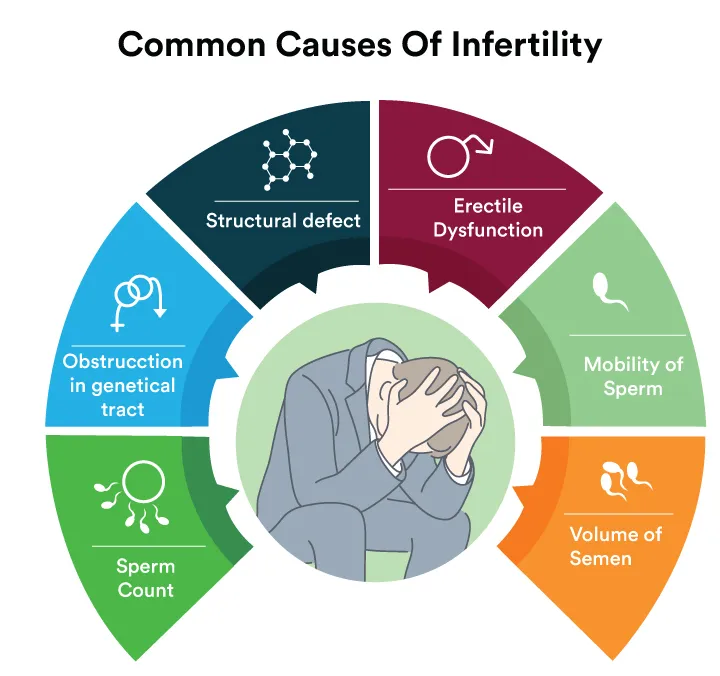
What Is Male Sexual Dysfunction?
Male sexual dysfunction refers to physical or psychological conditions that prevent a man from having a satisfying sexual experience. It’s a common issue, especially with advancing age, but it’s not a normal part of aging and is often treatable.
Factors like chronic illnesses, medications, lifestyle habits, and emotional stress can contribute to dysfunction. If symptoms persist, it’s important to consult a urologist, as untreated sexual dysfunction can impact personal relationships and overall quality of life.
With Dr. Deval Parikh you are offered advanced, personalized treatments for male sexual dysfunction to help restore sexual health and confidence.
Types of Male Sexual Dysfunction

Erectile Dysfunction (ED) / Impotence

Anejaculation

Ischemic Priapism
1. Erectile Dysfunction (ED) / Impotence
Erectile Dysfunction (ED) is the inability to achieve or maintain an erection sufficient for sexual intercourse. It is one of the most common types of sexual dysfunction in men.
Symptoms:
- Trouble getting or maintaining an erection
- Decreased sexual desire
Causes:
- Physical: Diabetes, high blood pressure, high cholesterol, heart disease, low testosterone, neurological disorders, smoking, medications, etc.
- Psychological: Stress, anxiety, depression, relationship problems
Diagnosis:
- Penile Doppler Ultrasound (PARKS, U.S.A.) to assess blood flow and nerve function.
Treatment Options at Aashray:
- ICIVAD Therapy
- Penile Prosthesis Implantation (Semi-rigid or inflatable)
- ESWT Therapy (Extracorporeal Shockwave Therapy)
- Vacuum Erection Devices (Osborne Medical Systems, U.S.A.)
2. Anejaculation
Anejaculation is the inability to ejaculate semen, despite having a normal orgasmic sensation. It may be primary (lifelong absence) or secondary (develops later).
Causes:
- Spinal cord injury
- Parkinson’s disease
- Diabetes
- Medications (e.g., antidepressants)
- Pelvic surgeries
- Psychological factors
Treatment:
- Vibrator Therapy (especially useful in neurogenic causes)
3. Ischemic Priapism
Ischemic Priapism (low-flow priapism) is a painful, prolonged erection caused by trapped blood in the penile chambers. It is a urological emergency if lasting longer than 4 hours, and if untreated, it can cause permanent ED.
Symptoms:
- Erection lasting more than 4 hours
- Painful, rigid shaft with a soft tip
- Increasing penile pain
Treatment:
- Extended External Cavernosal Drainage to relieve trapped blood and restore circulation.
Why Choose Dr. Deval Parikh?
With advanced diagnostics, minimally invasive procedures, and highly experienced specialists like Dr. Deval Parikh, you are ensured comprehensive care for all forms of male sexual dysfunction, restoring not just function, but confidence and quality of life.

What is Male Infertility?
Male infertility is a condition where a man has difficulty getting his partner pregnant despite having regular, unprotected intercourse for a year or longer. It contributes to about one-third of infertility cases.
Male fertility primarily depends on the quantity and quality of sperm. Low sperm count or poor sperm quality can reduce the chances of conception. Other contributing factors include:
- Hormonal imbalances
- Obstructions in sperm pathways
- Genetic disorders
- Chronic health conditions
- Past surgeries or injuries
- Lifestyle factors
Who Is an Ideal Candidate for Surgical Treatment?
Surgical treatment is considered if:
- You’ve had regular intercourse without contraception for over a year and are still unable to conceive
- You have a severely low or absent sperm count
- You’ve had a vasectomy
- You experience pain or swelling in the testicles
- You’ve had surgeries involving the groin, testicles, penis, or scrotum
Surgical Treatment Options for Male Infertility
1. Vasoepididymal Anastomosis (VEA):
A microsurgical procedure used in cases of obstructive azoospermia caused by a blockage in the epididymis. The procedure connects the vas deferens directly to the epididymis, allowing sperm to pass through again.
- Requires high surgical precision due to the delicate structures involved.
2. Vasal Reconstruction
Used for reversing a previous vasectomy or treating obstructions in the vas deferens. This is also a microsurgical technique to restore sperm flow.
3. Varicocele Ligation (Varicocelectomy)
What is a Varicocele?
A varicocele is an enlargement of the veins in the scrotum, similar to varicose veins in the leg. It is one of the most common and treatable causes of male infertility and can lead to:
- Reduced sperm production
- Poor sperm quality
- Testicular discomfort or pain
Symptoms of Varicocele:
- Often painless, but may cause:
- A dull ache or heaviness in the scrotum
- Swelling, mostly on the left side
- A feeling of a “bag of worms” in the scrotum
Diagnosis:
- Physical examination, especially while standing or during the Valsalva maneuver
- If unclear, a scrotal ultrasound may be recommended
Types of Varicocele Repair Procedures
A. Open Surgery
Performed under local or general anesthesia using microsurgical techniques via an inguinal or subinguinal incision. Offers:
- Minimal tissue damage
- High success rate
- Faster recovery
B. Laparoscopic Surgery
- Done under general anesthesia
- Involves small incisions and the use of a laparoscope
- Typically completed in 1–2 hours
C. Percutaneous Embolization
- A minimally invasive procedure is done by an interventional radiologist
- A catheter is inserted into a vein in the groin or neck
- Coils or sclerosing agents are used to block the varicocele veins
- Takes around 45 minutes to 1 hour
Risks of Varicocele Ligation:
- Hydrocele formation (fluid around the testicle)
- Infection
- Recurrence of varicocele
- Injury to the testicular artery
Recovery Timeline:
Procedure | Recovery Time | Return to Work |
Open Surgery | 3–6 weeks | ~1 week |
Laparoscopic Surgery | 2–4 weeks | 3–5 days |
Percutaneous Embolization | 1–2 days | Within 1–2 days |
